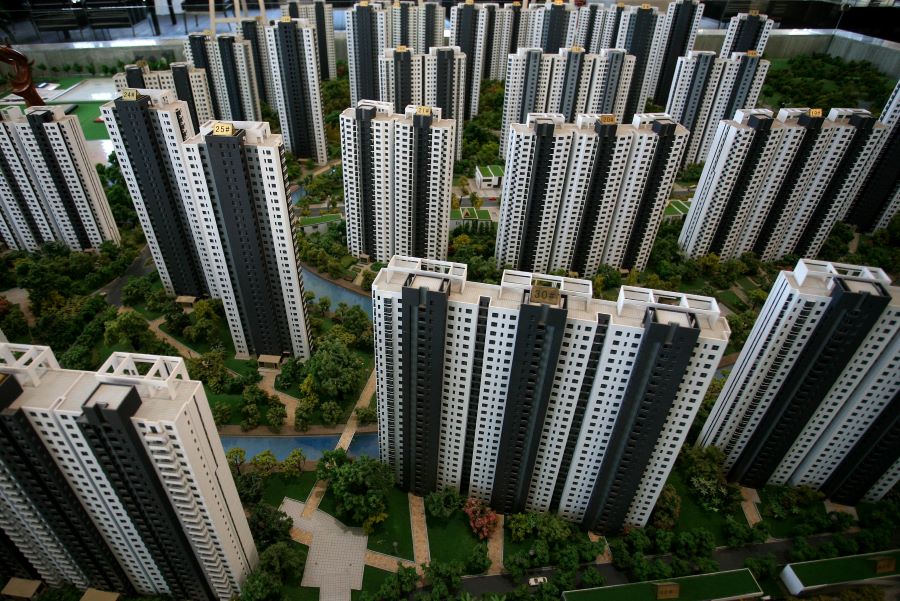Yuzhou Slims Down Under State-Mandated Credit Diet for Property Firms

The mid-sized developer’s shares are down more than 50% this year as Beijing restricts the sector’s ability to borrow
Key Takeways:
• Yuzhou Group has breached one of China’s “three red lines” for real estate builders, which will limit its annual debt growth to 10%
• The borrowing constraint will make it more difficult for the company to refinance maturing debt and develop new projects
By Warren Yang
For smaller Chinese property developer Yuzhou Group Holdings Co. Ltd. (1628.HK), bulking up its business while trying to slim down debt seems like a difficult task. That’s been problematic for its shareholders, who have been dumping stock for Yuzhou and many of its peers this year.
Yuzhou, which was founded in 1994, is among many Chinese real estate developers that expanded massively over the last two decades by issuing debt, a strategy approved by Beijing leaders eager to develop the nation’s property market. But now the government is saying: Enough is enough.
That’s created a range of headaches for developers, which led Moody’s Investors Service to downgrade its outlook for China’s entire property sector to “negative” earlier this month. That was followed by a rating cut for struggling industry giant Evergrande by Fitch Ratings last week, the third by the rating agency since June. Smaller players like Yuzhou are feeling the pinch especially hard due to their limited financial resources and are under pressure to find ways to keep investors interested in their stocks.
Under a “three red lines” policy introduced last year, a property developer’s liabilities cannot exceed 70% of assets; net debt cannot surpass 100% of equity; and the ratio of cash to short-term borrowing should be 1 or higher. If a company fails to meet all three conditions, it cannot increase debt at all in the following year. From there, it can boost its debt by up to 5 percentage points for each condition fulfilled, to a maximum of 15% if it meets all three conditions.
As things stand now, Yuzhou has crossed one of the red lines. Its liabilities-to-assets ratio stood at 74% at the end of June, although that was down somewhat from six months earlier, according to its latest interim results released last month. If the figure stays above 70%, the company will not be allowed to increase debt by more than 10% next year, assuming it continues to meet the other two conditions.
Even 10% credit growth would represent a sharp slowdown for Yuzhou, whose total debt grew at a compound annual rate of about 23% in the three years to 2020.
These new rules mark a U-turn for China, which previously used debt-funded real estate development to drive economic growth. But priorities are shifting, as Chinese policymakers worry about the impact of a potential property market collapse, as well as growing wealth disparity that partly derives from people who have made fortunes on real estate investments.
The borrowing constraints create two problems for Yuzhou and other debt-heavy developers.
Firstly, such restrictions hamper their ability to refinance debt, especially IOUs coming due soon, raising the risk of default. Evergrande is a good example in that regard, with insufficient cash to cover its short-term debt. Refinancing risks look lower for Yuzhou. But restricted access to credit also makes it difficult for developers to finance new projects, hamstringing their ability to boost revenue and cash flow.
Negative Outlook
In addition to curbing credit, Beijing has also made life difficult for developers by reducing availability of state-owned land for residential property construction. At the same time, the government is trying to cool demand for properties by capping the volumes of mortgages that banks can issue for home buyers and guiding lenders to raise interest rates for such loans.
Such measures could ultimately lead to a slowdown in home sales, hurting revenue growth at developers. Some companies may cut property prices to boost sales, though such actions will inevitably erode their margins.
Reflecting the gloomy prospects, shares of Chinese real estate developers are down sharply this year. Yuzhou’s stock has taken a particularly hard hit, down more than 50% year-to-date through Sept. 10, compared to about a 35% drop for Times China Holdings Ltd., 40% for China Aoyuan Group Ltd. and 18% for Midea Real Estate Holding Ltd., all smaller Hong Kong-listed real estate developers. At their current level, Yuzhou’s shares now trade about 20% below their 2009 IPO price.
Yuzhou’s shares may be faring worse than others among this group of duds due to its inability to boost revenue, compounded by doubts around the way it recognizes sales. The developer reported an impressive near-sixfold surge in revenue in the first half of this year compared with a year earlier.
But it was only able to achieve such growth only after admitting its revenue for the year-ago period was actually 85% less than it initially reported last year. The company said the restatement in this year’s interim report was necessary because some initially recognized revenue was deferred, partly as a result of the reclassification of some entities as joint ventures from subsidiaries.
Without the “adjustment,” Yuzhou’s first-half revenue this year would have actually declined from the first half of 2020 and increased just 3% from two years earlier. By comparison, revenue at China Aoyuan grew 15% year-on-year in the first half of this year.
Forming joint ventures is relatively common among Chinese developers, allowing them to take on projects without adding debt to their own balance sheets. The use of joint ventures may become even more prevalent as companies seek to circumvent the three red lines rules. But it makes their finances more opaque, and can cause hiccups in revenue recognition, as seen in Yuzhou’s case. Adding projects by using joint ventures also makes it tougher to control their development and cash flow. Indeed, slow revenue recognition due to heavy use of joint ventures was partly behind a Moody’s downgrade for Yuzhou in March.
Yuzhou is still profitable, and despite its big stock decline this year trades at a relatively high price-to-earnings (PE) ratio of 6.1. That’s far better than 2.2 for Times China, 1.8 for China Aoyuan and 3.3 for Midea Real Estate. But these gaps could narrow quickly if Yuzhou fails to boost its profits, which could put further pressure on its stock.






